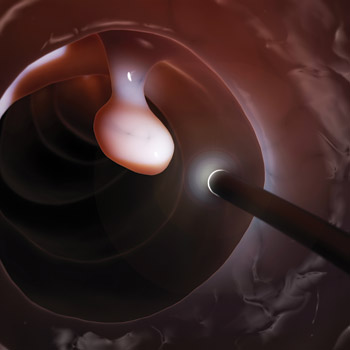Uptake of CRC screening leaves room for improvement
This issue also covers IMGs and immigration policy, along with conference coverage on gastroenterology and the art of diagnosis.
Screening for colorectal cancer works, and can even help physicians stop the disease before it starts, but for many, it can be a hard sell. The U.S. Preventive Services Task Force recommends a handful of screening options and doesn't prioritize one above the other, which could mean that the best screening test is the one patients will complete. But that can be difficult to determine on an individual basis, with some patients declining to follow up on fecal occult blood tests and others flat-out refusing a colonoscopy. To complicate matters further, physician offices aren't always equipped to manage every type of test, and reimbursement issues can also cloud the picture. Physician-researchers have been sorting through dizzying combinations of tests and incentives to try to pinpoint the most effective, and as always, results can and do vary. In our cover story in this issue, staff writer Mollie Frost (formerly Durkin) talks to experts to get the very latest advice.
ACP Internist has covered the effect of changes in U.S. immigration policy on patient care (see “Treating patients afraid to present,” October 2018), but our second cover story in this issue looks at how the new regulations are specifically affecting physicians. International medical graduates (IMGs) make up an estimated 25% of the U.S. physician work force, yet there is concern that the U.S. climate has become less welcoming and more uncertain in recent years, with paths to permanent residency in question. Immigration policy's effects on physicians could have ripple effects throughout the country for both IMGs and U.S. physicians as well as for patients in rural and underserved areas, where many IMGs practice.
Our conference coverage this month comes from the American College of Gastroenterology's annual meeting, which was held right here in Philadelphia last October, and the Diagnostic Error in Medicine 11th International Conference, held in New Orleans last November, with a pair of stories from each. Read about one expert's theory on functional gut disorders, including a potential link between irritable bowel syndrome and functional dyspepsia. Another expert reviews the potential risks of proton-pump inhibitor therapy and details why he believes the findings of recent negative studies should be taken with a grain or three of salt. In addition, learn why under- and overdiagnosis can be considered sides of the same coin and how time can be the most important ingredient in improving diagnosis.
Last but certainly not least, I'd like to wish a very happy 2019 to all our readers. We look forward to covering the events of the coming year in health care for you. Please email us, and let us know what you'd like to read about.
Sincerely,
Jennifer Kearney-Strouse
Executive Editor



